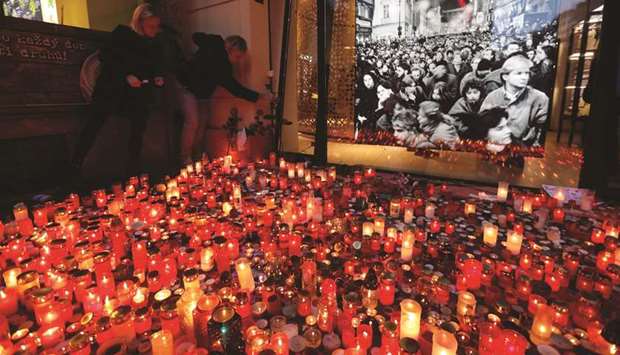Czechs celebrated the 30th anniversary of the Velvet Revolution yesterday, flocking to central Prague for concerts and speeches to mark the end of communist rule.
The festivities took place one day after 250,000 Czechs rallied against Prime Minister Andrej Babis and President Milos Zeman over concerns that the pair are chipping away at democracy in the nation 10.7mn people.
The two political leaders kept a low profile during the events, though Babis paid an early-morning visit to a memorial where police beat up student protesters in 1989 – a crackdown that sparked the wider rallies against the totalitarian regime.
Babis struck a non-confrontational tone after a short visit when about a dozen protesters confronted the billionaire businessman.
“As you surely know, I was a Communist Party member. I’m not proud of that,” Babis said at a ceremony attended by the prime ministers of Hungary, Poland and Slovakia and by German parliament speaker Wolfgang Schaeuble. “Although we can differ in our opinions – and we do differ – that is what political opinions are for.”
He said he “wasn’t as brave” as Vaclav Havel, the dissident playwright elected the president of Czechoslovakia in 1989, and thanked those behind the Velvet Revolution protests.
“I’m standing here today as the prime minister elected in a free, democratic election, and therefore I want to, at least now, express my gratitude and humility,” said Babis, whose minority government now relies on the tacit support of Communist party lawmakers to survive in parliament.
Babis took office after his ANO (YES) party won the 2017 general election, campaigning on an anti-corruption ticket.
On November 17, 1989, Communist police brutally crushed a students’ march, sparking a student demonstration and the creation of an opposition movement which then negotiated the Communist Party’s departure from politics.
In late December 1989, Havel, then the opposition leader, was elected president of Czechoslovakia, which went on to peacefully split into the Czech Republic and Slovakia in 1993.
The neighbours joined Nato and the EU, with Bratislava also joining the eurozone in 2009.
The events yesterday offered Czechs more of a party, with the unseasonably warm weather bringing out families and offering others a chance to sip beers outside while listening to the concerts and speeches.
A reenactment of the student march wound its way through the city and allowed people to hear from dissidents who participated in the protests that ended communist rule peacefully in Czechoslovakia weeks after the Berlin Wall fell and brought Havel to office.

People are seen at a memorial in Prague during a reenactment of the 1989 protest march marking the 30th anniversary of the 1989 Velvet Revolution.
